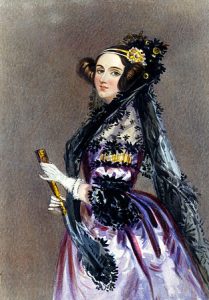
Ada Lovelace, 1815-1852
To commemorate Ada Lovelace Day today Heads of Department have nominated colleagues who are leading in the areas of Science, Technology, Engineering and Maths (STEM). These women are being profiled all week on the Research blog and across social media channels.
Yesterday we featured Professor Wen Tang and Dr Melanie Coles from Creative Technology and Computing respectively.
Tomorrow the spotlight will be on the areas of sports psychology and exercise physiology with profiles of Dr Amanda Wilding and Dr Rebecca Neal.
Thursday highlights Dr Roya Haratian from Electronics, as well as Dr Michele Board and Dr Vanessa Heaslip from the Department of Nursing Science.
We close the week on Friday with a post featuring Professor Jane Murphy, Professor of Nutrition and Dr Sue Green, also from the Department of Nursing Science.
Who was Ada Lovelace?
Ada Lovelace Day is named after Ada Byron, the Countess of Lovelace, who is often regarded as the first computer programmer for her work in machine programming. Born in 1815 to the poet Lord Byron and Lady Anne Byron, a mathematician, Ada collaborated with inventor Charles Babbage on his general purpose computing machine, known as the Analytical Engine. She was the first to recognise that the machine had applications beyond pure calculation, and to have published the first algorithm intended to be carried out by such a machine.
Ada Lovelace Day is now an international celebration of the achievements of women in STEM subjects. It aims to raise the profile of women working in these subjects and, in doing so, encourage more girls into STEM careers, as well as supporting women already working in STEM.
Find out more about Ada Lovelace day celebrations on the Finding Ada website.
 Ada Lovelace Day 2021 at BU: celebrating women in STEM – Professor Jane Murphy and Dr Sue Green
Ada Lovelace Day 2021 at BU: celebrating women in STEM – Professor Jane Murphy and Dr Sue Green










 REF Code of Practice consultation is open!
REF Code of Practice consultation is open! BU Leads AI-Driven Work Package in EU Horizon SUSHEAS Project
BU Leads AI-Driven Work Package in EU Horizon SUSHEAS Project Evidence Synthesis Centre open at Kathmandu University
Evidence Synthesis Centre open at Kathmandu University Expand Your Impact: Collaboration and Networking Workshops for Researchers
Expand Your Impact: Collaboration and Networking Workshops for Researchers ECR Funding Open Call: Research Culture & Community Grant – Apply now
ECR Funding Open Call: Research Culture & Community Grant – Apply now ECR Funding Open Call: Research Culture & Community Grant – Application Deadline Friday 12 December
ECR Funding Open Call: Research Culture & Community Grant – Application Deadline Friday 12 December MSCA Postdoctoral Fellowships 2025 Call
MSCA Postdoctoral Fellowships 2025 Call ERC Advanced Grant 2025 Webinar
ERC Advanced Grant 2025 Webinar Update on UKRO services
Update on UKRO services European research project exploring use of ‘virtual twins’ to better manage metabolic associated fatty liver disease
European research project exploring use of ‘virtual twins’ to better manage metabolic associated fatty liver disease